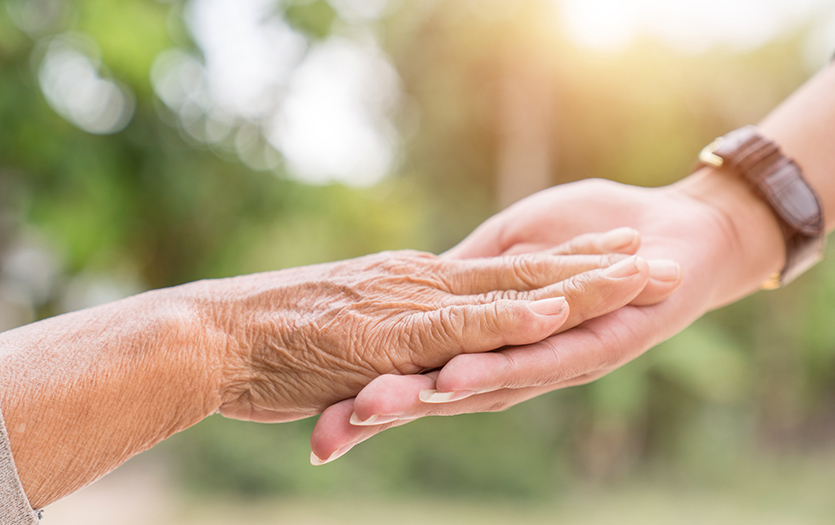
End-of-life care and bereavement support require a special blend of compassion, spiritual awareness and emotional resilience. Karen Kosberg, after completing the Clinical Pastoral Education program, became Parkview Hospice’s first chaplain nearly 28 years ago. Karen shares with us the pivotal role of chaplains in hospice care, the benefits of bereavement services and some lessons she’s learned along the way.
What does the role of a hospice chaplain entail?
Hospice is a program and ministry dedicated to end-of-life care. For patients to be eligible for hospice, they have received a terminal diagnosis of six months or less. Our philosophy is a holistic approach to caring for a person and their loved ones, which includes providing physical, emotional and spiritual support. As a chaplain, I focus on the spiritual aspect of their care. I often tell patients when I visit, “Our nurses are coming to make sure you're as comfortable as you can be in your body. My role is to help you have peace of mind and peace in your spirit.”
We offer spiritual and emotional support in a variety of ways. Providing anticipatory grief counseling is an important part of the patient’s journey. My role is to walk with and guide them as they anticipate leaving their families and as their loved ones anticipate the loss of the patient. A large part of what we do is listen and be present with families and help them normalize their feelings.
I’m hardly ever in an office. Most of my time is spent in the community visiting patients in their homes, nursing homes or assisted living facilities. I can be called to a patient's passing to be there with the family. I also do funerals for patients who don’t have a clergy or someone to assist with a memorial service.
What is your approach to meeting a patient and family's unique needs?
During our first contact with a patient and their family, we conduct what we call a spiritual assessment. This helps us understand where they are spiritually. We talk about their faith traditions, what their background is, and their hopes and fears.
Depending on their faith traditions or background, we may provide certain rites or rituals, prayers, scripture, hymns, music, communion or baptism. On occasion, a chaplain may need to act as a mediator or bridge to reach out and connect or reconnect the patient with their faith background. Whether they come from a Jewish, Christian, Islamic or Buddhist faith or no faith at all, we have the resources to ensure the patient has what they need based on their spirituality.
Additionally, engaging in a life review is often very meaningful for our patients. We give them the space to think through their life and acknowledge their accomplishments and regrets.
What resources are provided to families after a loved one has passed?
Another part of my role is participating on the bereavement support team. After a patient has passed, we collaborate with the social workers and reach out to their loved ones to assess where they are in the grieving process and what support we can offer them.
Families can anticipate ongoing contact with the hospice team during the first year. We send out mailings that offer advice on dealing with the grieving process and taking care of themselves. Depending on their needs, our follow-up can look like individual counseling or grief support groups. If we believe they could benefit from more intensive counseling, we may refer them to a counselor specific to their needs.
Either annually or bi-annually, each hospice branch hosts an interfaith memorial service and invites the families, loved ones and caregivers of the patients who we have cared for over the past few months. Loved ones can send in photos for a montage video and during the memorial, we say their names and honor their memory.
Why is it beneficial for patients to have access to chaplaincy and bereavement services?
I believe we are all spiritual people, and there is a difference between spiritual and religious. In real estate, they say it’s all about location, location, location. In spirituality it’s relationship, relationship, relationship. We have a relationship with ourselves, with those around us and with the divine or God. For someone at the end of their life, there are so many questions regarding these relationships. How do I say goodbye? Are there things I need to say… to change? A chaplain is someone who will walk with them through this important time and will pay attention to those relationships and the spirit of the person.
Because chaplaincy and bereavement work together with each case, I think it brings patients comfort knowing that someone they have come to trust is going to be checking in with their loved ones and making sure that they are okay after their passing. It also helps the families cope and move through their grief to know they aren’t alone. They have someone to validate that their reactions and grief feelings are normal.
How do you maintain your own emotional or mental well-being while providing support to others?
For me, feeding my spirit and maintaining my emotional well-being through my faith, community and personal faith is key. The support of my loved ones and engaging in activities like daily walks, my hobbies and listening to music are vital. I am also fortunate to work with a very compassionate and supportive team. It’s important to have people you can vent to and share with. When it’s been an especially tough case or loss, we know we have each other to lean on and process it together.
Compassion fatigue and burnout are very real issues for those in any caregiver role. Maintaining my well-being isn’t just important for myself, but also for the people that I serve. Being present with them and walking them in this journey means that I need to be as healthy as possible.
What do you find to be the most rewarding part of your role?
The most rewarding part is meeting the people and their willingness to share part of their lives, stories and sometimes their innermost fears. It's such an honor to be able to enter somebody's world at such a significant time and witness the strength, love and vulnerability of both patients and their loved ones.
I’ve had the opportunity to spend time with people from various walks of life, cultures and faiths. It’s shown me that, regardless of our differences, we share common life experiences. Facing our own or a loved one’s mortality is one of them. It’s helped me to understand the humanity in grieving, loving and honoring someone until their last breath.
Seeing grief and loss daily can also be challenging. Sometimes we have patients who just touch our hearts in a special way, some for a long time and others less than expected. Even in the midst of the loss and grief we feel, there’s a sense that we can and are making a difference in the lives of the people we serve.
Learn More
If you have questions or want more information about hospice and palliative care services or a patient referral to Parkview Hospice, please call 260-373-9800 or 800-363-9977. You can also complete our online form here. We are happy to answer your questions and walk those paths with you.



